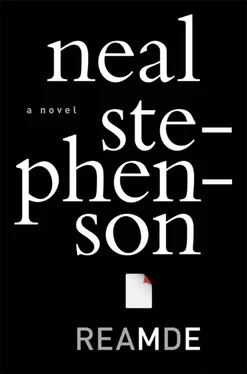From this remove it did not look hugely different from other places; just more crowded. Humidity and smog caused buildings that were only a few blocks away to be shrouded in mist, like matte paintings in the background of an old Soviet movie, creating the feeling that everything was farther away than it really was. This made it difficult to get a sense of how far the city sprawled. The hot and humid climate was inconvenient, since it limited the sorts of things that one could carry in one’s clothing, or else forced one to go about conspicuously and suspiciously bundled up. This, however, would not really be a problem until they set out to liquidate the Troll, and based on what Zula and Peter and Csongor had been saying on the plane, they wouldn’t have that information for a few days at least.
This building was situated on the inland side of the six-lane avenue that ran along the waterfront. Across that avenue was an arcade of ferry terminals that stretched along the shore for at least a kilometer, fronting on a waterway that was as busy as any that Sokolov had ever seen. Because he had been looking at maps, he knew that this body of water was a strait separating Xiamen from a smaller island about a thousand meters away, but it was impossible not to read it as a river: a mighty river like the Volga or the Danube. But the docks were linked to the terminals by hinged gangways, confirming that this water was salt and that it rose and fell with the tides. Plying the strait was an astoundingly dense and various traffic, ranging from skiffs up to freighters, but dominated by two types of craft: tubby, double-decker passenger ferries, and a type of vessel that he hadn’t seen before but that was evidently the traditional working craft of these waters: an open, flat-decked boat rising no more than a meter above the waterline, shingled along both sides with old tires, averaging maybe ten meters long, with a little boathouse, or at least an awning, toward the stern, sheltering the engine, the steering gear, and the operator. These were so densely packed in some areas that it was a wonder they could move at all, and each was carrying something different: passengers, a drum of lubricant, a pallet of shrink-wrapped cargo, a cooler packed with ice and fish. Weaving and zipping among these larger, slower vessels were white speedboats carrying passengers in orange life vests: fast water taxis for the well-heeled, he guessed. Some of them were headed directly across the strait to the little island, which was steep and green and seemed to consist largely of parks and villas. Obviously it was older and more affluent than the suburbs that Sokolov could see reaching toward Xiamen from every direction, difficult to resolve through the haze, but much more heavily built up.
All of which was unusual and picturesque but probably did not bear directly on the mission. Sokolov turned his attention to the picket line of buildings like this one that stood along the inland side of the big avenue. There were a few other modern blue-glass skyscrapers, and some construction sites where new ones were being erected. But at least half of the frontage was claimed by buildings of older vintage, sporting the logos of hotels and Western food chains. Directly below them was a building of perhaps a dozen stories with a huge KFC sign on its top. Its entryway was choked by taxis, which made Sokolov think that it must be a hotel, probably catering not to Westerners but to Chinese business travelers. It fronted on a traffic exchange. In the center was a raised circle in the middle with traffic lights on it, but other than that, this was just a hectare or so of pavement that—as was obvious from Sokolov’s point of view—had, over and over again, been slit open and trenched and cabled and repaved. It supported a steady flow of taxis, buses, motor scooters, the occasional Lexus or Mercedes. On the opposite side of the exchange was a curving building with a panoramic billboard, colorful photos of fashion models and liquor bottles, offices fronting on the intersection, their nature unguessable by Sokolov since they didn’t have any English in their signs. The architects of these buildings had lavished a huge amount of attention on rooftop antenna masts, which were far more massive and squat and wide-stanced than was really called for by pure engineering considerations. They must have been trained in the Soviet Union and been steeped in the mid-twentieth-century statist mindset that a building without a radio transmitter was like a battleship without guns. It was a technology and a reason largely forgotten now but preserved in the architecture in the same way as church steeples. What really mattered to the mission at hand was not radio transmitters. It was that zany web of patched pavement cuts splattered all over the streets below, where Internet had been laid down.
He kept noticing basketball courts and realized that, from where he stood, he could see four of them, all new and well tended.
On patches of open ground here and there, he saw people executing slow, formalized movements, then recalled that Chinese liked to do calisthenics.
Not far away, a broad street led away from the water for at least two kilometers. It was lined with expensive-looking Western-style storefronts. It ran along ground that was table flat, but off to its right a kilometer or so, spines of gray stone rose out of the ground, supporting tufts and copses of dark green vegetation. Remnants of ancient fortifications, steep and ivy matted, were grafted onto the rock, and newer buildings grew out of those.
These parts of the city—the ferry terminals, the skyscrapers and skyscrapers-to-be, the older generation of high-rise buildings, the basketball courts, the shopping street, the outcroppings of stone—were the special bits. All told, they accounted for perhaps 25 percent of the city’s surface area. The remainder was all the same: an undifferentiated expanse of close-packed buildings, four or five stories high, often with blue roofs (why blue?) built on a warren of streets so narrow that, in general, he could not see the pavement, but had to infer, from the pattern of crevices between buildings, that streets must exist. In the rare places where such streets aligned with his sight lines, enabling him to see all the way to the bottom, they appeared to be paved not with asphalt but with human beings in motion, and vehicles marooned in the sea of people.
He felt certain that the Troll lived in a neighborhood very much like one of these. He needed to know what it would be like to move and fight in such a place. His initial thought was “more like Grozny than Jalalabad,” but he would have to do much better than that. He did not even know, for example, whether Xiamen had any sort of underground mass transit system that could be put to use.
A faint humming sound alerted him to the approach of wheeled luggage. He turned to see Ivanov approaching from the direction of the elevator lobby, towing a black rollaway bag. One of the squaddies jumped up and offered to help him with it, but Ivanov brushed him off with a flicking gesture and came straight for the conference room. Sokolov opened the door. Ivanov entered without breaking stride, heaved the bag up, and slammed it down on the conference table. “You may open it.”
Sokolov unzipped the top flap and peeled it back. The entire bag was filled with magenta currency.
“Our obshchak, ” Ivanov joked. At least Sokolov hoped he was joking.
All the notes were the same denomination: 100 RMB. They were printed in an uneasy mixture of purplish reds, and each bore a portrait of the young Mao Zedong. None of the bills was loose; they had been stacked into bundles of various sizes. Sokolov picked up a small one.
“Ridiculous country,” Ivanov said. “One hundred is the largest denomination that exists. You know how much it is worth? Fourteen dollars . They print nothing larger because if they did, it would be counterfeited instantly. So changing money is a huge problem. I am already tired.”
Читать дальше





